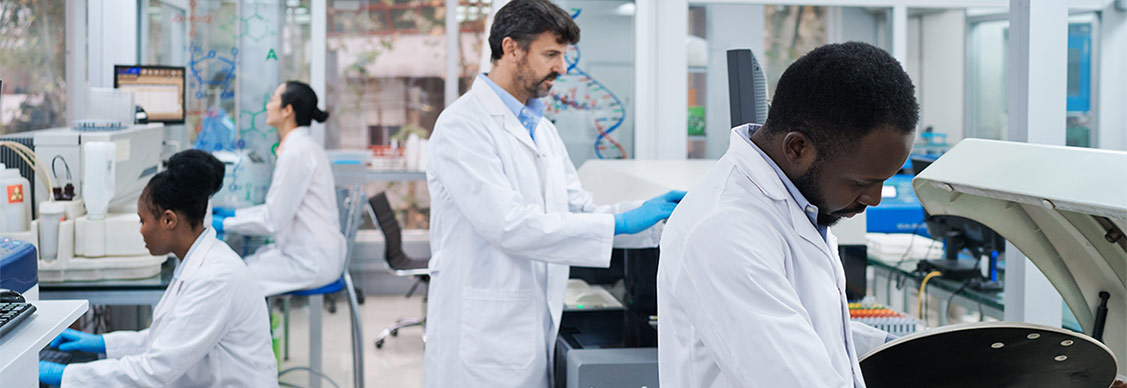Science start-ups drive demand for life-science hubs
Rising need for leased lab space is fuelling next-generation scientific communities
Life sciences companies have been growing at pace since the pandemic put the industry in the spotlight. Ageing populations, technological advances, and rapid innovation in new fields such as weight loss and anti-body drugs are driving expansion.
The number of newly-formed life sciences companies – including biotech, health technologies and pharma start-ups – is up more than 13% in the past five years.
As a result, more specialized lab space is required, but in European life science clusters, it’s not so readily available, with vacancy in multi-occupancy lab and incubator spaces extremely tight. In the U.S., lab demand rose by over 6% in the first quarter of 2024, with quarterly growth for lab space in Boston, the Bay Area and San Diego averaging 17% in recent months.
“Competition for lab space is being fuelled by the fact that many established pharma companies are now outsourcing elements of research under contract to these smaller firms” says Suketu Shah Head of UK Life Sciences Property Management for JLL.
Commercial real estate investors are taking note. They now rank life sciences second on a list of sectors that provide the greatest opportunity, up from 17th pre-pandemic, according to JLL’s 2024 Investor survey. And as the need for flexible space rises, a new generation of multi-tenant hubs is emerging, particularly in the most mature life science clusters.
Take the 100,000 sq. ft life sciences, technology and innovation space planned on the site of a former Debenhams in the heart of Oxford. The site will provide a much needed, high specification solution to the requirements of the city’s fast-growing science, technology and innovation sectors.
In Dublin, Pioneer Group’s Cherrywood campus caters for companies at the early stages of incubation, with space for over 100 life science and health technology professionals, entrepreneurs, and researchers.
Looking for more insights? Never miss an update.
The latest news, insights and opportunities from global commercial real estate markets straight to your inbox.
Drug discovery is an expensive business
With budgets at new life science companies tight, and the cost of specialist equipment high, smaller firms are seeking to avoid large upfront capital outlay.
Enter ‘easy-in, easy-out’ multi-tenant hubs and incubator spaces, which give them shared access to the kit they need, with the cost covered by rental premiums or service charges.
“It reduces risk by allowing smaller firms and start-ups to channel their limited funds into core research,” says Shah. “Regular lease breaks also mean they can easily scale up - if and when they secure the next round of funding.”
The conversion of the iconic Victoria House in London’s Bloomsbury Square will cater for this scenario by offering the option to upgrade to dedicated space with premium equipment, a boon for growing companies.
Custom Not Found
Cannot serve request on this server.
Social space drives opportunities for innovation
Aside from cost efficiencies, life science hubs bring various stakeholders together, helping create an eco-system of collaboration, and opportunities to develop partnerships.
“They accelerate ideas and productivity, reflecting the spirit of innovation in the life sciences industry,” Shah says.
Thoughtfully designed coworking spaces, meeting rooms and conference facilities further build connections. In Paris, BioLabs Hôtel-Dieu is a new entrepreneurial life science community for biotech and medtech start-ups, while in the U.S. LabCentral uses its communal event spaces to host a wide range of diversity and equity-driven programs, mentoring and workshops, alongside fun social events.
What’s more, with budgets stretched, facilities such as gyms, yoga studios and cafeterias would be beyond the realms of younger firms if they followed the traditional sole-occupier model.
“Scientists expect a level of experience and comfort on par with what you would find in other top-tier work environments,” says Shah. “Quality amenities help attract and retain the best talent, which is vital to the success of the research.”
Critical facility considerations
With between 10 and 20 companies typically occupying multi-tenant hubs at any given time, security, quality control, compliance and critical facilities management can be challenging.
“Tenants working towards scientific operating accreditations and regulations such as Good Manufacturing Practices (GMP) or Good Laboratory Practices (GLP) will require stringent security access to buildings and labs,” says Shah.
Property managers must take on different challenges with lab space than they would more traditional commercial real estate such as offices. For instance, planning preventative maintenance to minimize the downtime of critical equipment, and system back-up options, becomes especially important.
Shah cites waste management as a key example of how managing shared lab space differs, with up to 42 different kind of waste streams needing detailed records and paperwork. “Even the cleaners need to be specialized and procured differently,” he says.
“The success of such hubs relies on their capacity to cater for companies at different stages in their evolution,” Shah says.
Contact Suketu Shah
Head of UK Life Sciences Property ManagementWhat’s your investment ambition?
Uncover opportunities and capital sources all over the world and discover how we can help you achieve your investment goals.
